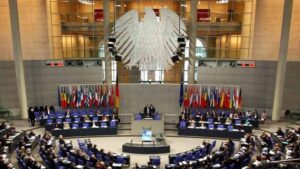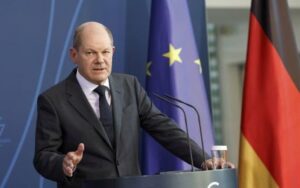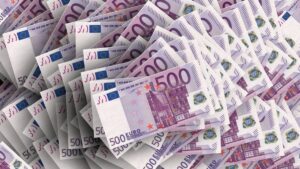
German President Frank-Walter Steinmeier has signed a law to reduce the number of seats in the Bundestag from 736 to 630, German media reported.
“The reform aimed at reducing the number of Bundestag deputies comes into force. Steinmeier signed the relevant law,” the Zeit newspaper reported, citing the president’s office.
The newspaper recalls that earlier in March, the bill was passed by the Bundestag.
The law, in addition to reducing the number of parliamentary seats, provides for the introduction of a hard barrier of 5% to get into the Bundestag. Options, which until now allowed to get into parliament without passing this barrier are abolished.
The Bavarian state government and the Christian-Social Union Party are going to take the law to court because they believe that it violates the constitution.

The German Foreign Ministry, strongly condemning the destruction of the Kakhovskaya HPP, announced the immediate delivery of generators, water filters, water treatment facilities, and equipment for the organization of temporary shelters to the affected regions.
“The destruction of the Kakhovka Dam in Ukraine is a violation of international humanitarian law and results in suffering and hardship for the civilian population as well as catastrophic consequences for the environment. We strongly condemn this malicious act,” the German Foreign Office said on Twitter.
“To help, we have already purchased 56 generators and 5,000 water filters, as well as items for shelter, which will be sent to Ukraine immediately,” the post specifies.
In addition, water purification equipment capable of providing drinking water to 60,000 people and dump trucks for garbage removal are being prepared for transportation. “Our partner organizations working in the region are assisting in the evacuation and distributing food kits to those in need.”
As noted, since the beginning of the war, the FRG has allocated more than 16.8 billion euros to support Ukraine. “This assistance includes humanitarian aid, internships, disaster response, stabilization projects and assistance in war crimes investigations, as well as humanitarian demining operations.”

Germany will contribute to post-war security guarantees for Ukraine, Federal Chancellor Olaf Scholz said on the sidelines of the European Political Community summit in Moldova.
“We are now making our contribution in support of Ukraine. And we have always said that there must be guarantees of a peaceful order after the war. And Germany will contribute. How they (guarantees – IF-U) will look in concrete terms, we have yet to discuss, and we have been talking about this for a long time,” Scholz said.
He said Germany’s financial, humanitarian and arms support to Ukraine is a contribution to ensuring that Ukraine continues to resist Russian aggression in the face of ongoing attacks.
“Our financial and humanitarian aid, as well as the support we provide with weapons, is very important – and, after the United States, is the largest contribution of any single country. What we have provided in terms of air defense is very important now, at a time when there are so many missile strikes, aircraft strikes, cruise missile strikes by the Russian Federation, and that is our contribution to make sure that Ukraine resists,” he said.
Scholz also stressed that holding such an event as the summit of the European political community is a contribution to the good development of a secure Europe. At the same time, the German chancellor assured that Russia’s war of aggression against Ukraine was his priority.
“What concerns us all most is Russia’s war of aggression in Ukraine, which calls into question the European architecture of peace and security and, of course, poses a terrible threat to Ukraine and the people who live there every day. In this regard, it is important that all states with no revisionist agenda of this kind come together and talk to each other here, far beyond their membership in the European Union,” he said.
“The European political community is a contribution to the good overall development of our Europe. It is very important that we support Ukraine. We do it on a large scale, and Europe is united in supporting Ukraine in defending its country,” Scholz summarized.

The German Federal Agency for Technical Assistance (THW) and the German Society for International Cooperation (GIZ) transferred 14 units of special vehicle equipment for the State Emergency Situations Service (SES), the press service of the Ministry of Internal Affairs reported.
“Fire truck ladders and fire truck elevators allow you to get to the upper floors of the building to evacuate people or to extinguish fires at height. Therefore, for us it is very necessary equipment, which is always in short supply, “- said the chairman of the State Emergency Service Sergey Kruk, quoted by the press service of the Ministry of Internal Affairs in Telegram-channel on Wednesday.

German media report about Ukrainian President Volodymyr Zelensky’s planned visit to Germany on 13-14 May, but there is no official confirmation from the Ukrainian side.
Thus, Bild reports that on May 14 Zelensky will be received by German Chancellor Olaf Scholz, the president of Ukraine will hold a meeting with German President Frank-Walter Steinmeier. In addition, Zelensky will visit Aachen, where he will be awarded the Charlemagne Prize.
Source

Secretary of State for Development, German government coordinator for international aid to Ukraine Jochen Flasbart, who arrived in Kiev yesterday, agreed on another aid package with Deputy Prime Minister Irina Vereshchuk and Ukrainian Finance Minister Serhiy Marchenko, the German Federal Ministry for Economic Cooperation and Development reported.
According to the report, the development ministry will invest an additional 111 million euros in housing for displaced people and in support for Ukrainian municipalities, such as renovating and equipping kindergartens, schools and hospitals.
“Rebuilding Ukraine will be a gigantic task for the country, its people and for us as an international community. And it is already beginning now, even if, unfortunately, there is no end in sight to the war. This long-term perspective and early planning is important. We want to show the people of Ukraine that we will continue to stand with them in solidarity. And we need to make sure that our short-term support matches the long-term recovery,” the secretary of state said.
He stressed that “this is also about investing in Europe’s future, because a strong economic Ukraine will also be an important pillar of our shared European prosperity.”
Flasbart is in Ukraine from April 18 to 19 as the federal government’s commissioner to coordinate international reconstruction efforts. In addition to talks with the Ukrainian government on expanding bilateral cooperation, the trip includes talks with Ukrainian civil society on strengthening anti-corruption measures and transparency, as well as an exchange of views with Ukrainian entrepreneurs. Flasbart is also holding talks with parliamentarians, the Ukrainian Association of Cities and Municipalities and the United Nations.
According to information, Berlin has provided 3.6 billion euros in civilian support to Ukraine since the start of Russia’s full-scale invasion last February.